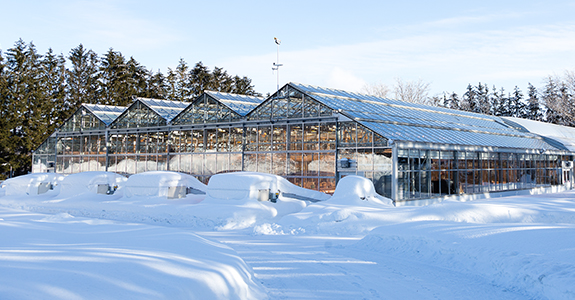Winter coverages and safety guide
As a horticultural business owner, you know the winter season can be a challenging time. Extreme weather conditions, such as snow, ice, and freezing temperatures, can pose a daily risk to employees, customers, and property.
This guide outlines two essential steps for a safer, stress-free winter: selecting appropriate insurance coverages for your business and adopting safety measures to help safeguard your employees and customers.
Horticultural insurance coverages
With winter just around the corner, it's essential to review your business insurance coverage and make sure you're adequately protected. Here are several important insurance coverages to consider for your horticultural business during the winter season.
Commercial property insurance
Winter weather can be unforgiving. Commercial property coverage helps protect your buildings, inventory, equipment, and income from damage caused by winter weather events, such as snowstorms, ice storms, and freezing temperatures.
General liability insurance
When unexpected events occur, general liability coverage helps protect you if you’re sued for bodily injury or property damage caused by negligence. This can be especially important during the winter months, when slips, trips, and falls are more common.
Workers' compensation insurance
Safeguarding your employees after an injury isn’t just a moral obligation, but typically a legal requirement in most states. Workers’ compensation coverage can provide medical benefits and income replacement to employees who are injured on the job.
Commercial auto insurance
Efficient and safe transportation of your products and supplies is vital. Commercial auto coverage helps protect your business vehicles and drivers from damage and liability in the event of an accident.
We offer customized insurance designed specifically for horticultural businesses. Contact us anytime to learn more about our coverage options.
Winter safety tips
The presence of snow, puddles, slick surfaces, and icy patches poses a significant risk to both your employees and customers. Implementing proactive safety measures serves as your primary safeguard against potentially costly claims.
Slips, trips, and falls
Snow, rain, and mud easily get tracked inside from people's shoes and boots. The tracked moisture can create serious hazards in greenhouses, nurseries, garden centers, and other facilities. Heavy-duty mats installed inside every doorway enable proper shoe and boot wiping and help prevent moisture from being brought in beyond the mat.
Ice and snow removal
Promptly clear ice and snow before and during winter storms, utilizing salt, deicer, or sand to enhance traction. Ensure driveways remain clear for employees and customers. Be vigilant about outdoor walkways, steps, and ramps, as they can become exceptionally slippery when accumulating snow, ice, sleet, and freezing rain. Uneven sidewalks and concealed potholes under snow can also lead to hazardous falls.
Roof maintenance
Neglecting snow accumulation on your building's roof can be both expensive and perilous. Maintain your indoor heating at the appropriate temperature to facilitate snow melting and prevent accumulation. In the event of a large snowfall, remove snow before it becomes too heavy and triggers a collapse.
Boiler maintenance
Regular boiler maintenance is crucial to avoid costly breakdowns and ensure your buildings stay warm throughout the winter. Be aware of the signs of a boiler breakdown and schedule an annual professional inspection and servicing.
Deliveries
Horticultural businesses have their own driving risks with deliveries, product transportation, and employees commuting to remote worksites. Establish strong motor vehicle safety policies, training, and inspections. Remind staff to wear seat belts, avoid distractions, and follow the rules of the road. Your team's safety depends on it.
Additional tips
By taking actionable steps to properly insure your business and enforce safety protocols during the winter season—you can help protect your employees, customers, and property. Here are some additional weather-related tips to help you mitigate risks:
Customize your safety plans. Prior to winter, conduct safety meetings to educate your staff on hazards, prevention, and reporting. Utilize facility posters and signs for reinforcement, and customize training to address specific workplace risks.
Practice your plan for severe weather events. This plan should include steps to evacuate employees and customers, secure property, and respond to damage.
Monitor weather conditions. Continuously monitor the most current weather forecasts and advisories from your local weather services to proactively implement necessary safety measures.
Even if you take precautions, accidents can still happen. Talk to your insurance agent to review your current coverages and limits. Hortica, a brand of the Sentry Insurance Group, has been dedicated to serving the horticultural industry—through all seasons—for more than 135 years. We can assist you in addressing your business’s winter challenges, prioritizing safety. Email us or give us a call today at 800-541-5082.
Related links:
Communicating regularly with your employees about safety is crucial. Explore these applicable tips for conducting productive employee safety meetings.
Get the facts about horticultural business insurance. We break down the top five misconceptions, unveiling the genuine benefits of specialized insurance.
Don’t neglect your greenhouse upkeep. Follow this step-by-step greenhouse maintenance guide to help prolong the life of your greenhouse.
The information in this article is for informational or entertainment purposes only. View our disclaimer by going to terms and conditions and clicking on Learning Center disclaimer in the table of contents.
